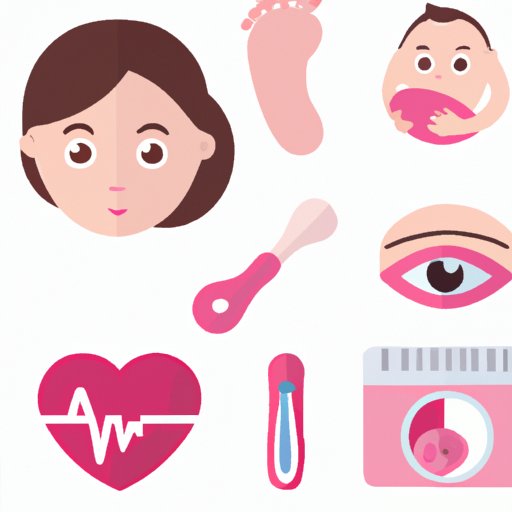
I. Introduction
Knowing when pregnancy symptoms can start is important for women who are trying to conceive or those who suspect they may be pregnant. There are several early signs of pregnancy that indicate a woman has conceived, but these symptoms can vary from person to person. Understanding when to expect symptoms can help women prepare for what’s to come and get the appropriate medical care they need.
II. The Early Signs of Pregnancy: When to Expect Symptoms
Understanding the menstrual cycle and ovulation is essential when trying to conceive. Once the egg is fertilized, it will travel to the uterus and implant in the uterine lining. This process typically occurs about a week after ovulation.
Implantation and early pregnancy can cause a range of symptoms, including mild cramps or spotting. These symptoms may be mistaken for early period symptoms. However, in many cases, they are indicative of pregnancy.
When pregnancy symptoms start can vary from woman to woman. Some women may begin to experience symptoms as early as a week after conception, while others may not experience any symptoms for several weeks.
Several factors can affect when pregnancy symptoms occur, including age, health, and medical history. Generally, women who are older, have a history of infertility, or use assisted reproductive technology may experience symptoms earlier than those who do not.
III. Are You Expecting? Common Pregnancy Symptoms and When They Begin
Nausea and vomiting are common early pregnancy symptoms that typically begin around 6 weeks of pregnancy. This symptom is commonly referred to as “morning sickness” but can occur at any time of the day.
Another common early pregnancy symptom is fatigue. Many women feel tired and sluggish in the early weeks of pregnancy due to hormonal changes in the body.
Breast tenderness and changes are also common during early pregnancy. The breasts may feel sore, swollen, or tender to the touch. The nipples may also darken and become more sensitive.
Food cravings and aversions are another common early symptom of pregnancy. Some women may experience sudden cravings or a dislike for foods they normally enjoy eating.
Mood swings are also common during early pregnancy. Hormonal changes can cause women to feel more emotional and experience mood swings.
Other common early pregnancy symptoms include frequent urination, constipation, bloating, and headaches. These symptoms typically begin around 6-8 weeks of pregnancy.
IV. From Tender Breasts to Nausea: The First Signs of Pregnancy
Tender breasts during early pregnancy are due to hormonal changes in the body. Estrogen and progesterone levels increase during pregnancy, causing the breasts to become sore or swollen. The breasts may also feel heavier or more sensitive to touch.
Nausea and vomiting are caused by increased levels of hormones, particularly human chorionic gonadotropin (hCG). This symptom typically begins around 6 weeks of pregnancy and can last throughout the entire first trimester.
Food cravings and aversions are due to hormonal changes in the body. Some women may experience sudden cravings for certain foods or a dislike for foods they normally enjoy.
Mood swings are also caused by hormonal changes in the body. The sudden increase in hormones can cause women to feel more emotional and experience mood swings.
The length of time each symptom lasts can vary from woman to woman. Some women may experience symptoms for only a few weeks, while others may experience symptoms throughout their entire pregnancy.
Tips for managing early pregnancy symptoms include staying hydrated, eating small, frequent meals, getting plenty of rest, and avoiding triggers that can worsen symptoms.
V. Pregnancy Symptoms: A Comprehensive Guide to Understanding When They Start
Other less common early pregnancy symptoms may include dizziness, fainting, heartburn, and nasal congestion. If these symptoms persist or worsen, it’s important to seek medical advice.
It can be challenging to know when to seek medical advice during early pregnancy. If you experience any bleeding or cramping, it’s important to contact your doctor immediately.
If you’re unsure whether your symptoms are normal or a cause for concern, it’s always best to seek medical advice. Your doctor can provide guidance and support throughout your pregnancy and help you determine when to schedule your first prenatal appointment.
VI. How Soon Can You Expect Pregnancy Symptoms to Begin?
As previously mentioned, when pregnancy symptoms start can vary from woman to woman. Factors that can affect when symptoms occur include age, health, and medical history.
To track your symptoms, it’s helpful to keep a journal or chart to record when symptoms occur and how severe they are. This can provide useful information for your doctor if you need to seek medical advice.
Home pregnancy tests can typically detect pregnancy around the time your period is due. However, it’s important to note that not all home pregnancy tests are created equal. Some tests are more sensitive than others and may be able to detect pregnancy earlier than others.
Tips for managing early pregnancy include staying hydrated, eating small, frequent meals, getting plenty of rest, and avoiding triggers that can worsen symptoms.
VII. Conclusion
When can pregnancy symptoms start? It’s a question many women ask, and the answer varies for each person. Understanding when to expect symptoms can help women prepare for what’s to come and get the appropriate medical care they need.
While it can be challenging to know when to seek medical advice during early pregnancy, it’s always best to err on the side of caution. If you experience any bleeding or cramping, it’s important to contact your doctor immediately.
Remember that every woman’s pregnancy journey is different. If you’re experiencing early pregnancy symptoms, know that it’s a sign that your body is changing and growing a new life. Seek support from family, friends, and healthcare providers, and take care of yourself during this exciting time.





